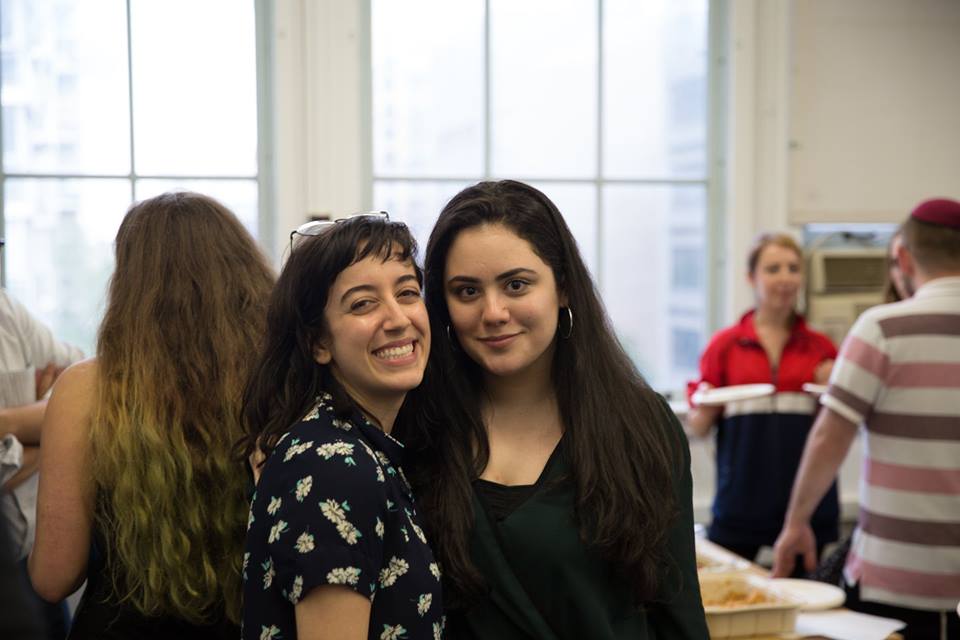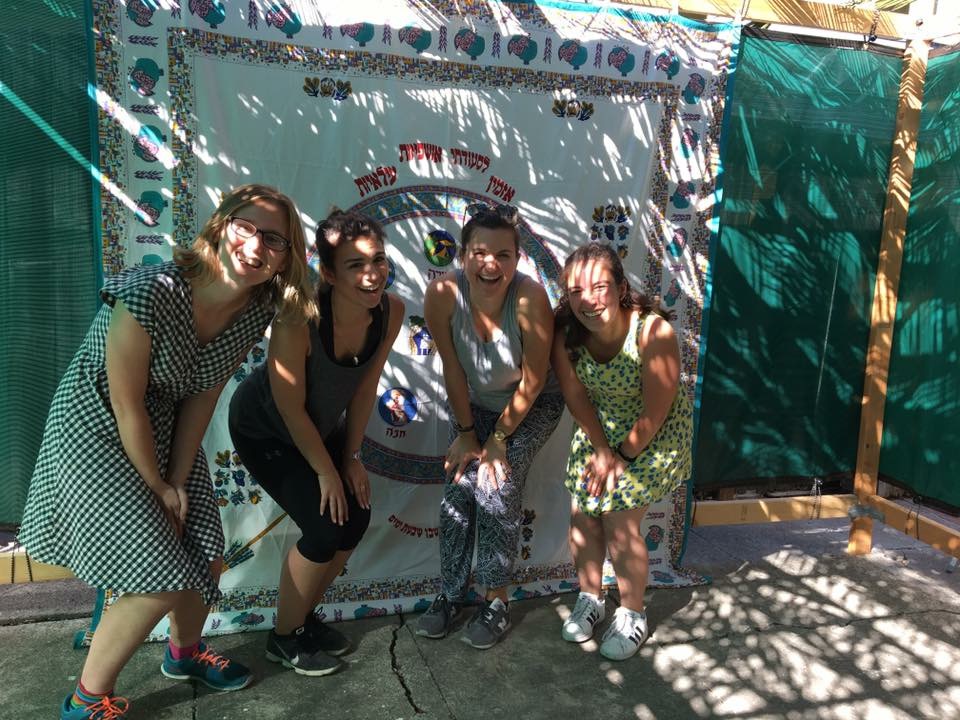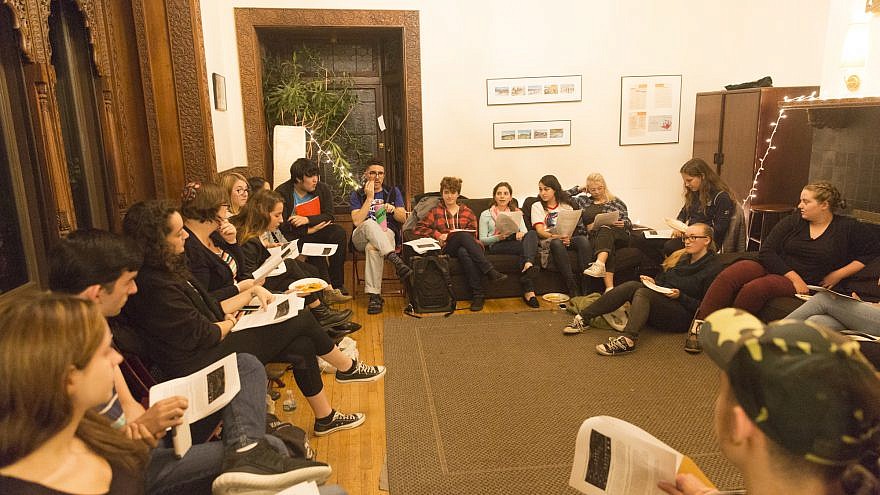Ester Shamailova says her parents, who are from Azerbaijan but now live in Brooklyn, N.Y., are very strict.
For that reason—and because of money—her only option after high school was attending a commuter school. She landed at Hunter College on Manhattan’s Upper East Side.
Shamailova says she initially didn’t make many friends. She said there were already established groups within the organization, and she was hesitant to introduce herself in part because she knew very little about Judaism.
“Am I supposed to be really interested in it?” she recalls thinking. “Is it OK if I don’t go to a lot of the events, but still am a member of the club and hang out in the lounge?”

Those anxieties have since faded. Now at the end of her junior year, the 21-year-old, spent the last year participating in the Jewish Learning Fellowship, or JLF—a Hillel experiential seminar aimed at increasing understanding of Judaism among college students.
Shamailova, who grew up with little connection to the religion, says the program has not only answered a lot of “big questions” she had about Judaism, but has also helped her become more comfortable around fellow Jewish students.
“You realize that it’s OK to have a different experience with Judaism, and that there is no one correct way to be a Jewish person,” said Shamailova.
‘It came alive in a new way’
That is the sort of outcome Hillel leaders are hoping to achieve—so much so that they’re putting additional resources into the program. This past school year, fellowships programs ran on 51 campuses, serving 1,200 students; in the fall, Hillel plans to offer fellowships on 100 campuses and hopes to attract some 3,000 students.
“Over the course of a semester, in addition to introducing students to Jewish studies, we also imagine that we are able to involve students into the community so that they feel like they have friends, a community, a mentor, and a newfound appreciation for Jewish text and inquisitiveness,” said Erica Frankel, managing director of the office of innovation at Hillel International.
That growth runs counter to data that shows Jewish college graduates in the United States have little interest in learning Jewish text. According to the 2014 Religious Landscape Study from the Pew Research Center, 74 percent of Jewish graduates said they read Jewish scripture seldom or never.
The 10-week fellowship has several different tracks, including “Life’s Big Questions, or How to Get More Out of College,” which features sessions on topics such as friendship, intimacy and Shabbat. Another track is “Sex, Love, and Romance: Toward a Postmodern Jewish Ethic.”
Staff members at New York University’s Bronfman Center for Jewish Life started the fellowship in 2007. Frankel was then an NYU student and had just returned from a Birthright trip to Israel.
“I said, ‘I have no idea what that is, but I am excited to do anything [Jewish] right now,’ ” recalls Frankel, who grew up in Georgia. “It was the first time in my life that I was really interacting with, seeing, looking inside Jewish text, and it came alive in a new way.”
After spending seven years as manager of student life at the Bronfman Center, Frankel joined Hillel International in 2015 to expand the fellowship program across the United States.
At each school, the fellowships are led by two educators who are able “to offer two different visions of what a committed, adult Jewish life looks like,” said Frankel.
Hillel also provides the students with a free meal at each session, and if they complete the fellowship, which also includes coffee dates and Shabbat experience, then they can receive a $300 scholarship.
“The fact that we are breaking bread with one another means that we can come to the table as very different Jewish people, and talk, discuss, disagree and ask questions,” said Frankel.
Comfortable teaching content to others
The idea of enticing college students to learn Jewish text through a meal and a scholarship is not unique to JLF. For example, the Maimonides Leaders Fellowship, a program started by an Orthodox rabbi at the University of Michigan in 1999, also provides students with free meals and a stipend or discounted trip to Israel upon completion.
In contrasting JLF with Orthodox programs, Frankel emphasized the pluralistic nature of the Hillel program.
“Unlike an Orthodox outreach program, we are able to teach Torah and offer Jewish curriculum that really speaks to a plurality of Jewish voices and Jewish expressions,” she noted.
At Hunter College, which is part of the City University of New York system, JLF also helps students on a practical level, said Merav Fine Braun, executive director of the Hunter College Hillel. A 2011 study from the City University of New York School of Public Health at Hunter College found that 39 percent of CUNY students are reported as being food-insecure.
With JLF “I know that at least … students have had that one meal,” said Fine Braun. “You can’t expect spiritual growth if your basic needs—food, shelter—are not taken care of.”
The Hunter JLF courses attracted 25 students in the fall and 59 students in the spring, according to Fine Braun.
She points to Shamailova as evidence of the program’s success. At the closing ceremony for the fellowship, Shamailova taught a “15-minute bit of Torah,” in which she applied the Jewish text to the question of vocation versus occupation, asking students if they are “following their calling” or “if they are aiming towards an occupation,” explained Shamailova.
“Within the span of 11 months, she went from never having engaged in any Jewish learning at all to feeling comfortable enough to teach it to others,” said Fine Braun.
For the first decade of JLF, the program has received funding from a number of different sources who either donate nationally or for a program at a particular campus, explained Frankel. Starting this year, JLF will be funded primarily by Mosaic United, an Israeli government program that pays for various Jewish initiatives on U.S. college campuses.
When asked about the Pew study showing the lack of interest in Jewish texts among college graduates, Frankel said “in many cases, they just haven’t been provided the opportunity.”
“Students elect to participate in the Jewish Learning Fellowship because someone invites them to. They see it as an opportunity not only to explore their tradition and their heritage, but also to meet new people and become part of a community,” she said.
‘Confident to connect with any Jew’
Ariel Starr grew up in Northern California with a Jewish father and a mother who was not religious. She wasn’t involved in Jewish life. She decided to attend University of California- Berkeley and study environmental science.

During the first class in the “Life’s Big Questions” track, they discussed Rabbi Akiva, a second-century sage who, according to some accounts, was illiterate for much of his adult life and only started to study Torah at age 40.
“That really stood out to me and set a strong precedent about how he started late in life,” said Starr, 20. “Even though college students aren’t nearly as late, it was a great sentiment to start off on.”
In addition to forming new friendships, Starr said the program made her feel more capable of learning Jewish texts.
“I feel so much more confident now to connect with any Jew that I meet,” said Starr. “And I think it was great because being with a bunch of young adults and talking about the questions non-academically, but still in a structured way, is an experience I don’t get in college.”


























